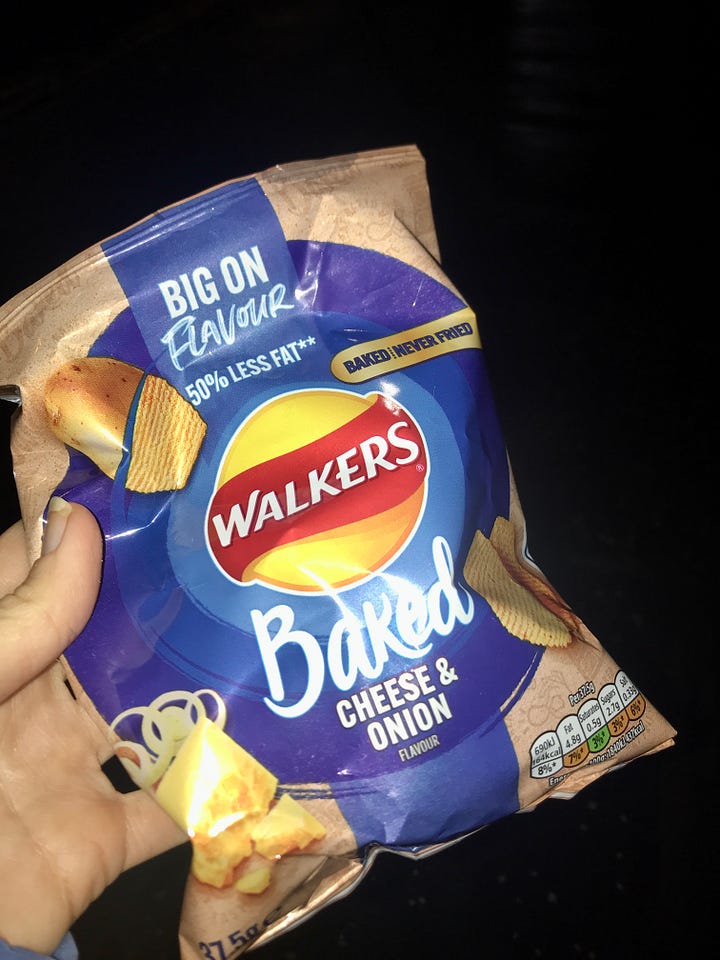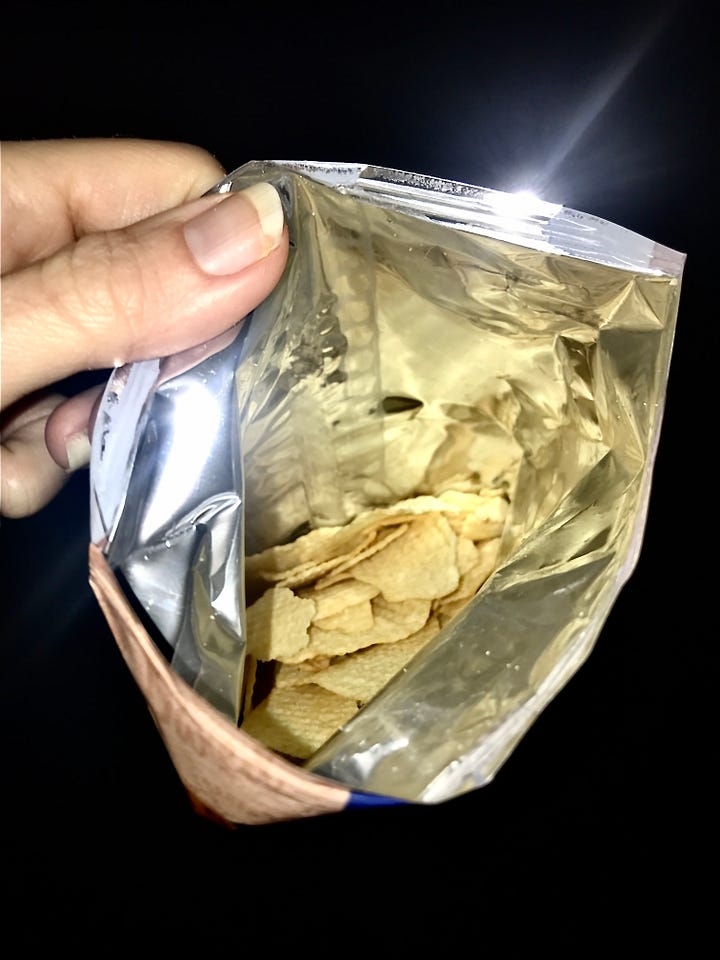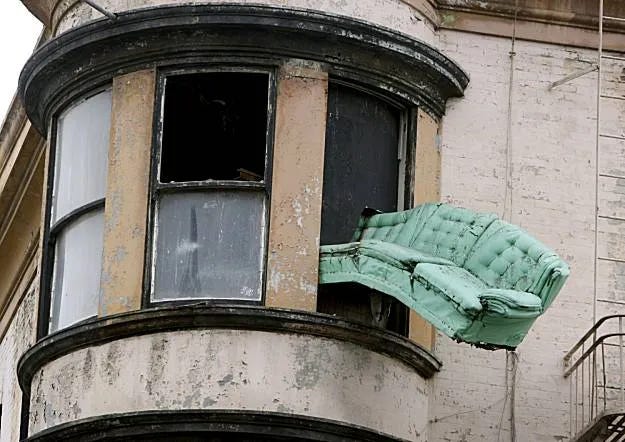Audio Article 🎧
The author, Eileen Myles, states, in an interview with Literary Hub (Myles et al., 2016), “In some way I want my writing to take care of me. I want to live in my worlds. I want to carry my world with me like a shell. I want a home.”1
The Irish singer, and activist, Bono, in an interview with SiriusXM VOLUME (2017), states that in a sense, as a band, U2 are “trying to write ourselves into existence because we fear our vanishing. … So, we’re writing, ‘I’m here!’” (1:06-1:17).2
December 31st 2023
There’s a New Year ritual in Southern Italy where they throw old things out of the window: pots, pans, furniture, electrics, utensils, carpets, etc., in the name of letting go. It’s just the sort of thing I would do. Once upon a time, though, I couldn’t have even entertained this as I lived on a patch of heathland in the Home Counties; roaming its nether regions, after work, drinking from the river. My lips were permanently chapped. I’d hunt for deer in the gloaming before going back to my studio flat to do my lesson planning. It occurred to me back then, that there were two types of teachers: those who plan, and those who don’t.
One day, I returned to find a bird in the tub. I’d left the skylight open, so it was my fault entirely and I took full responsibility.
“What do I do?” I texted a friend who I knew I could rely upon to be rational about such things.
I then sat there with the bathroom door shut to, with my ear to it, waiting for my phone to vibrate.
It didn’t, but not to worry as I’d already been proactive and used Google search to ascertain what portent this was - this winged visitation. The results were ominous, to say the least.
Had someone died already? Or were they going to? Or, worse, was I going to? Had this little brown bird come to kiss me goodbye?
The fact remained though that something was trapped inside which shouldn’t have been. The bird was in the wrong place and it was in deep distress.
I could feel its distress through the walls, especially when it started to get confused, hitting the walls and the mirror, repeatedly, beating its wings and banging its tiny frame against the mirrors: scared.
As Hitchcock showed us via Tipi Hedren’s immaculately neurotic lead in The Birds (1963), it’s within us all to become ever so slightly deranged by the sight of something which should be free, contained where it shouldn’t be.
More to the point, why are birds so fear-inducing when they are trapped and so wondrous when they aren’t? The same sort of feeling occurs with the abject, for example, when you come across a hair in your drink, either your own or the baristas.
January 1st 2024
When I came to emptying the bath, that night after a long, candlelit soak with the scent of jasmine, rose, and neroli permeating the walls and lingering between my thighs, I swirled the remaining twigs and leaves down the plughole, mired in orange blossom oil, and loose winter hair.
At first light, I happened upon a deer. It was caught in between the avenue of lime trees. It looked at me, alert and ready to dart and I came face to face with myself and all my years of running.
I often miss London; the heat, the architecture. Bermondsey on Saturdays, with my camera—looking for something: maybe, myself.
January 2nd 2024
I’m watching a C4 documentary on Cam Girls. The documentary charts the lives of five girls who all state, categorically, how ‘camming’ has empowered them.
The plus-sized women have grown secure in the knowledge that in Cam Land, poised discreetly on the duvet, they are actively pursued via a chain of niche, golden hashtags and that, in fact, they are sought after.
The Pakistani woman explains she is doing it for the family which meant working all hours until burnout ensued. She also makes it clear that compared to the salaries she would typically be able to draw in, working in a call centre, for example, she was now able to single-handedly pay for her Irish Nan’s private physiotherapy.
Next up, was a single Mum from Essex, blonde and pneumatic, with trout lips and fillers: your MYLF of choice with an Estuary accent. Accordingly, much of her client base were young men in their mid to late twenties. She never seemed to not be working, in one way or another, maintaining strict rules around not camming when the kids were in, and keeping it to school hours, where possible. She’d recently become aware that other Mums on the school run had started to talk about her behind her back but as far as the kids were concerned, Mummy was upstairs with the door closed on video calls like all the other Mums.
She expressed a desire for camming to become lucrative enough for her to be able to buy the kids a house in the country and more of the middle-class lifestyle that she had benefitted from. When she goes on a photoshoot to Marbella for an online beach promo to up her ‘follower’ count, she delivers repeat monologues on not wanting to leave the kids, not even for four days. The kids don’t want Mummy to go either, and, in the event, the eldest plays truant and she returns to a letter from the school on the mat. She is never not kind to them though and there’s clearly a lot of love in this house.
January 3rd 2024
Let’s talk a little bit about the use of the term ‘girl’. A flurry of articles have homed in on it as an example of gendered language which demeans women, particularly in the workplace.3 As a woman in my forties, I can say I have no problem with being called a ‘girl’. Freya India’s Substack is called GIRLS. The writer, Joanna Walsh, through an innovative novel and experiment in form explores the term in Girl Online (A User’s Manual) (2022)4. I explore the term, curated identities and virtual intimacies specifically through track eight, “Girl Online” (Talbot, 2023c)5. A more politically-correct title, such as ‘Woman Online’, ‘Person Online’, ‘Person who Menstruates Online’ or ‘Vagina-Owner Online’ just would not have cut it. Besides, as I tend to extract my titles from the song after it is recorded, the title was already there.
I also take listeners down the dirt roads of my mind covering such PC territory as that in track 27, “Woman (Womb-tastic!)”, a song buried in the mid-section of the album between “Dead White Men Working on Overtime” and “Spreadsheets”, in which, I sing:
‘Don’t you like the round, the wholeness of it? / On the tongue, look, what it makes my mouth do. / Wo-wo-wo-wo, w-o-m-a-n, like glue. / Like womb, like womb-tastic! / Yes, I have one inside me. / I’m a woman, woman, woman, woman, what about you?’
A year prior to release, I had performed this song with the Wall of Death Collective at The Old Hairdresser’s, Glasgow. We were a performance collective who had received funding to expand practice research beyond the university. I had just returned from the “Space Junk Broadcast Tour” in Venice, Italy, in October, 2022, during which I performed impromptu sets broadcasting an earlier incarnation of Space Junk via Bluetooth, carrying the portable amp around the city with me and making a noise.
Below is iPhone footage, taken by the filmmaker, Simone Smith, of me wearing a Venetian mask which I bought in Venice, which I also wore on occasion, as I moved around the city.
In this footage, I am performing dark, twisted karaoke to my own tracks, less than sixty hours into a broken collarbone, flooded with adrenaline and armed with a drumstick. I mention this because risk and persistence have become themes in the work.
I could have cancelled the set but I did not want to do that. We had planned and promoted it for months. As it went, on the night, I felt little, if any, pain, and hardly anyone noticed.
“You’re punk AF, Sam. You have to write this down,” texted Damien.
As a working-class artist, one has to just get on with it. I tend to think class never goes away, it just gets squeezed into other forms. Namely, art.
The cultural and film theorist, Catherine Liu (2021), asserts that despite class pacification under neoliberalism, class still matters. Yet, liberal discourse continues to prioritise gender and race over class and the latter doesn’t get much air time. Yet the professional managerial classes abound, and the working-classes might just fall under the auspices of the post-class fractured mass, lacking solidarity.
Talk of class brings us back to inheritance and property. Revolutionary cultural movements such as punk could barely happen today with gentrification, spiralling rents, and major urban hubs being unaffordable for many. The bored and affected can no longer afford the space and time to be dialling up lyrical revolutions, leaving ennui to neoliberalism, which tends to breed anxiety.
January 4th
The YouTube algorithm has flagged up a channel called Wandering Turnip, run by an ex-actor from up North who used to live in London and said he still would if he could afford to.
His Death of the High Street series takes us on his exploration of the UK and its boarded up city/town centres. In a recent episode - Why is London Disappearing?6 - we find him wandering about Covent Garden and Soho hunting down boarded up shop fronts.
To his surprise, he finds many. He then has a pint with a chap who talks him through the ins and outs of business rates. He gets out an online calculator which estimates the rateable values of the properties they come across. Even the air around The Shard costs, the man explains. “Forfeiture Notices”, “To Let” boards, bailiff services, etc, abound. We witness five units in a row, then seven, then an entire row, of boarded up shops covered in pretty posters and picture facades.
I do love a straight-talking Northerner and he’s particularly good at telling it like it is. He passes a unicorn pasted across another unit, then a woman singing a beautiful aria before landing upon more boarded up shops.
He then laments the prospect of walking around Denmark Street and finding its musical legacy gone, but fortunately, this isn’t the case. What he doesn’t touch upon though is what should be done with these outlets. If Covent Garden can’t survive, then where does that leave Wakefield town centre? Or Dronfield? Or any field?
For anyone who’s ventured out of London, and been graced with having a few hours to kill in any number of decimated towns up North or in the South-West, or Cornish towns, which are full of third-home ownership and feel like ghost towns, the sheer poverty of soul and spirit, and opportunity, seeps through your bones. What is more, there is nothing for young people to do in these places.
One possible solution to these boarded up shop fronts, would be to get artists in to sort things out. But this is an unlikely prospect. Have architects transform these places into co-living/working and community housing ventures where people can actually afford to live and stay, with capped rents.
It is a serious question, though, one of housing and community, and a ticking timebomb. Where, for example, are my generation going to live? And all this at a time when much union activity, such as that experienced in the troubled sector of HE7 as institutions continue to collapse. The sector has been caught up in the pension crisis of late. Those on relatively secure tenure, as well as zero-hours, fixed-term or rolling contracts are striking. Yet, there’s a whole other sub-section of precariat staff for whom this pension crisis doesn’t even figure because they could never even afford to pay into one. When working at universities in the South-East, for example, my artist/colleagues and I commuting in from London had to ‘opt-out’ of the automatically ‘opt-in’ pension schemes because we couldn’t afford not to.
January 5th 2024
On autotheory and class (cf. Barthes, 1990; Berger, 2005; Cruz, 2019, 2021; hooks, 2000, 2006; Ogrodnick, 1999).8
In an interview with the songwriting/podcasting duo, Sodajerker, (one half of whom is Dr Simon Barber of The Songwriting Studies Network), the self-described working-class artist, Catherine Anne Davis, aka, The Anchoress,9 asks: “Who is allowed to be creative? Who is allowed to write?” (Sodajerker, 2022, 00:51:59).
Aside from the ideological slant, it is worth revisiting our formative years for insight upon this.
Empirical research in early-years and child behavioural psychology suggests that re-connecting with what you used to do freely around 7-9 years of age is what you really should be doing, in essence. Yet, life gets in the way and many of us disengage with this. Moreover, the psychologist, and student of Freud, Carl Jung, concluded that the latter half of life is about going inwards and acknowledging what needs to come out, or else. If we ignore our inner calling, it will only bite back.
Immersive experiences are strongly associated with the often cited concept of ‘flow’ (which is not pleasure, but optimal immersion) as defined in positive psychology by the Czech/Austrian psychologist, Mihaiy Csikszentmihalyi (2014)10, but which has existed by other terms in religious practices for years. In a sense, spontaneous song is a type of meditative state.
Going back to what we did freely as children, I would sing, on school buses, in plays, choirs, back gardens, alleyways, bedrooms and the back of cars travelling around with my Dad with the radio on. What did you do?
Babies engage in spontaneous song, ‘imaginative song’, or ‘invented song’, as it is termed in the field to ‘self-sooth,’ entertain themselves and negotiate their own private worlds. They also tend to do this private. The same could be said of the recording artist isolated in the vocal booth, or the bedroom producer, cocooned in their sonic landscape with sunset lamps, mixing and bouncing their private and imaginative realms as lossless WAVs.
I watched the second episode of the Cam Girl documentary. This was on “dual camming”. Two Scottish girls drove out to do a DIY loch-side shoot as a teaser to post on social media. This micro-content was then rolled out on TikTok and Instagram reels. In the event, both girls found the experience to be not only more fun but more lucrative than solo camming and agreed they’d make time for it at least once a week. It seemed to be they found solidarity in it.
The other takeaway was that none of these women intended to quit camming any time soon. The sassy 25 year old red head who steered the dual camming shoot joked about the money she gets just for lying there and talking to men, and how she intends to become a big name in the industry, which is a likely prospect considering she already has her clients “eating out of her hand”.
Talking of which, below is a freshly opened crisp bag, which is 50% LESS FAT** no doubt because they’ve gone and removed 80% of the content. Remember when we were kids, and crisp bags were full of, well, crisps? This is shrinkification.


January 6th 2024


A Berlin-based artist and animator, Xenia Fink, direct messaged me to say she had been listening to Space Junk, and was “completely spellbound”. Another friend messaged the day prior to say it was “a gift”. Both DM’s lit me up like little fires inside. Do you get it? Did it make you feel something? Do you like it? Do you like me?
Xenia then used the extended drum, drone and voice track “Object Voice” (Talbot, 2023e)11 off Space Junk in which I repeat the words “I love you”, over and over, in her animation drapery, a clip of which can be watched via the QR code below.
This track was entitled after Mladen Dolar’s A Voice and Nothing More (2006)12 through which he theorises voice as a primary locus for the Lacanian objet petit a, the unattainable object of desire whilst conceptualising the role of desire in hearing bodily sound.
January 7th 2024
Track 25, “Pneuma/Non-Commodity”13 has been included on The F-List Featured Artists January playlist.14
Myles, E., Ozeki, R., Khakpour, P., March, A. and Kleeman, A. 2016. Writing the body: Trauma, illness, sexuality, and beyond. Literary Hub. [Online]. 6 December. [Accessed 4 January 2024]. Available from: https://lithub.com/writing-the-body-trauma-illness-sexuality-and-beyond
SiriusXM VOLUME. 2017. Bono on songwriting. [Facebook]. [Accessed 23 August 2024]. Available from: https://www.facebook.com/siriusxmvolume/videos/bono-on-songwriting/10155893827120929/?_rdr
Madsen, S. 2021. Why calling women “girls” is a bigger deal than you may think. Forbes.[Online]. 10 December. [Accessed 3 December 2023]. Available from: https://forbes.com/councils/forbescoachescouncil/2021/08/09/why-calling-women-girls-is-a-bigger-deal-than-you-may-think
Walsh, J. 2022. Girl online (A user’s manual). London: Verso.
Talbot, S.L. 2023c. Girl online. Sam Lou Talbot. Space junk. [Online]. Glasgow: Sam Lou Talbot. [Accessed 12 October 2024]. Available from: https://samloutalbot.bandcamp.com/track/girl-online
Wandering Turnip. 2023. Why is London disappearing? [Online]. [Accessed 19 December 2023]. Available from: https://youtube.com/watch?v=GPJti1ASGcc&t=7s
Fleming, P. 2021. Dark academia: how universities die. London: Pluto Press.
Barthes, R. 1990. A lover's discourse: fragments. Translated by R. Howard. Penguin: Harmondsworth.
Berger, J. 2005. And our faces, my heart, brief as photos. London: Bloomsbury.
Cruz, C. 2019. Disquieting: essays on silence. Toronto: Bookhug Press.
Cruz, C. 2021. The melancholia of class: a manifesto for the working class. London: Repeater.
hooks, b. 2000. Where we stand: class matters. New York: Routledge.
hooks, b. 2006. Outlaw culture: resisting representations. London: Routledge.
Lowndes, S. 2016. The DIY movement in art, music and publishing: subjugated knowledges. New York: Routledge.
Anchoress. The Anchoress’s website. (2023) [Accessed 29 October 2023). Available from: https://theanchoress.co.uk
Sodajerker. 2022. Sodajerker. Episode 223. The Anchoress. [Podcast]. [Accessed 18 November 2023]. Available from: https://www.sodajerker.com/episode-223-the-anchoress
Csikszentmihalyi, M. 2014. Flow and the foundations of positive psychology: the collected works of Mihaly Csikszentmihalyi. Berlin: Springer.
Talbot, S.L. 2023e. Object voice. Sam Lou Talbot. Space junk. [Online]. Glasgow: Sam Lou Talbot. [Accessed 17 December 2023]. Available from: https://samloutalbot.bandcamp.com/track/object-voice
Dolar, M. 2006. A voice and nothing more. Cambridge, MA: MIT Press.
Talbot, S.L. 2023b. Pneuma/non-commodity. Sam Lou Talbot. Space junk [Online]. [Accessed 29 September 2023]. Available from: https://samloutalbot.bandcamp.com/track/pneuma-non-commodity
F-List for Music. 2023. The F-List featured artists. [Spotify]. [Accessed 8 December 2023]. Available from: https://open.spotify.com/playlist/6aphBOhpORtTNi5JsQ4NR5








